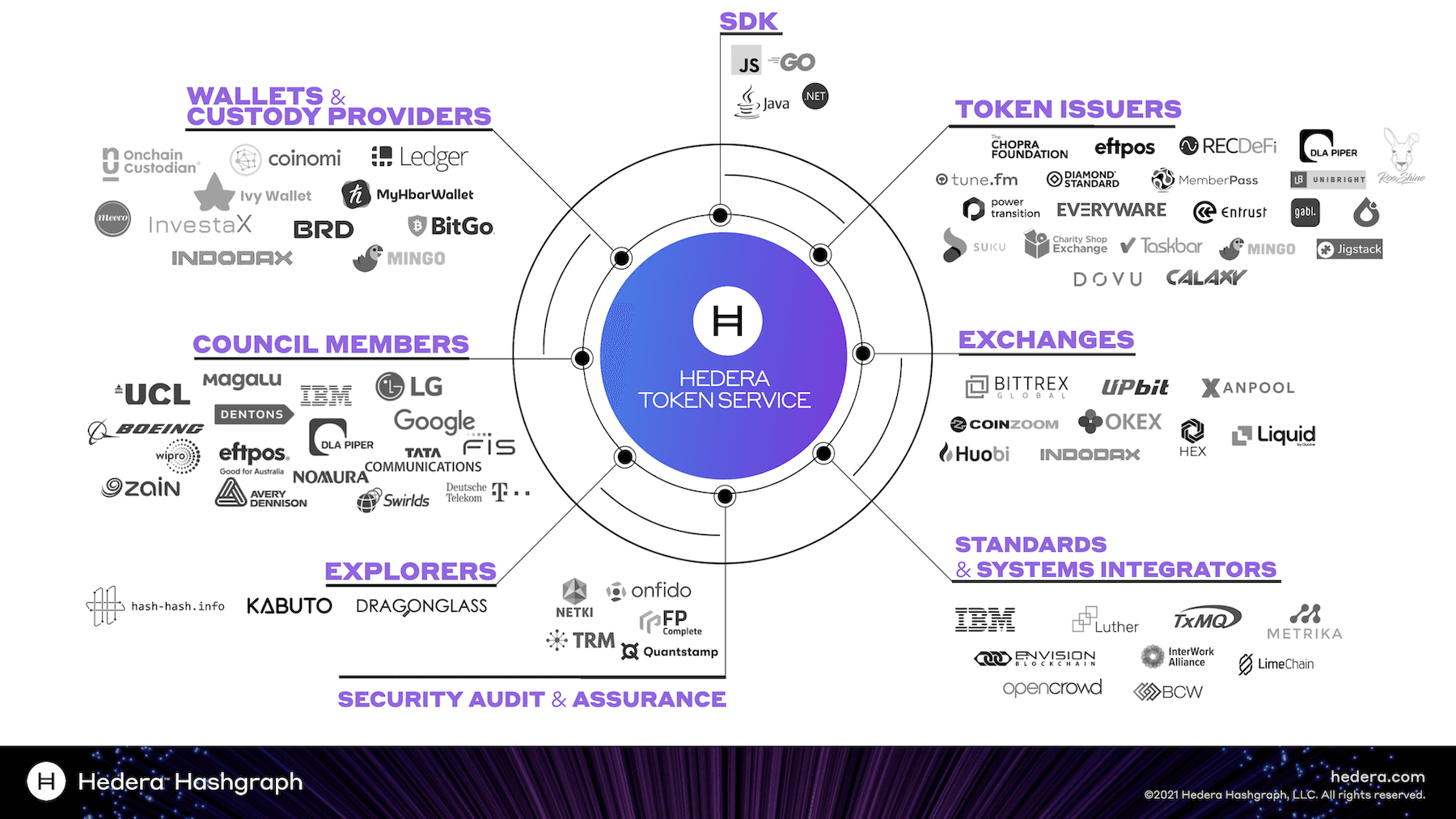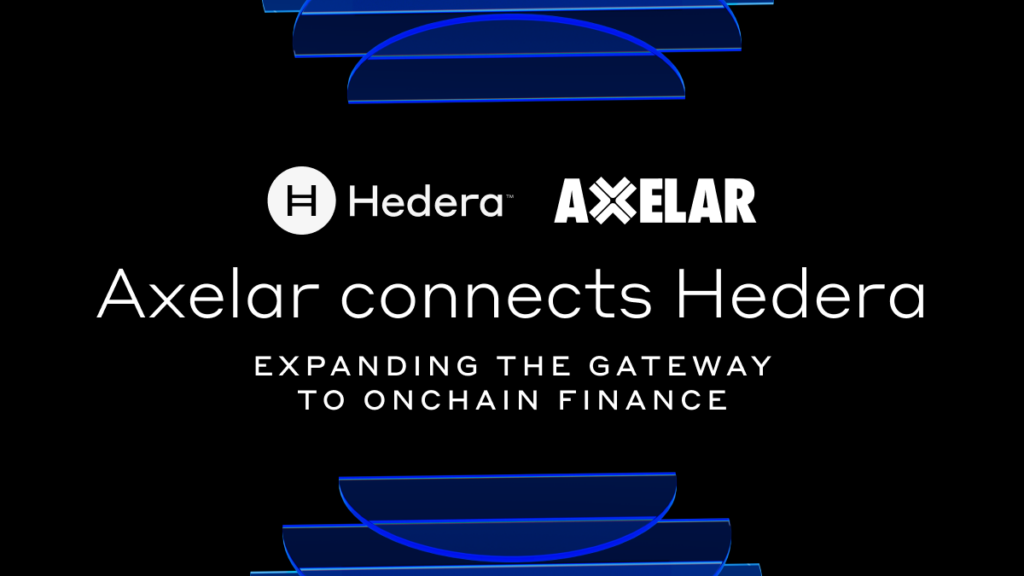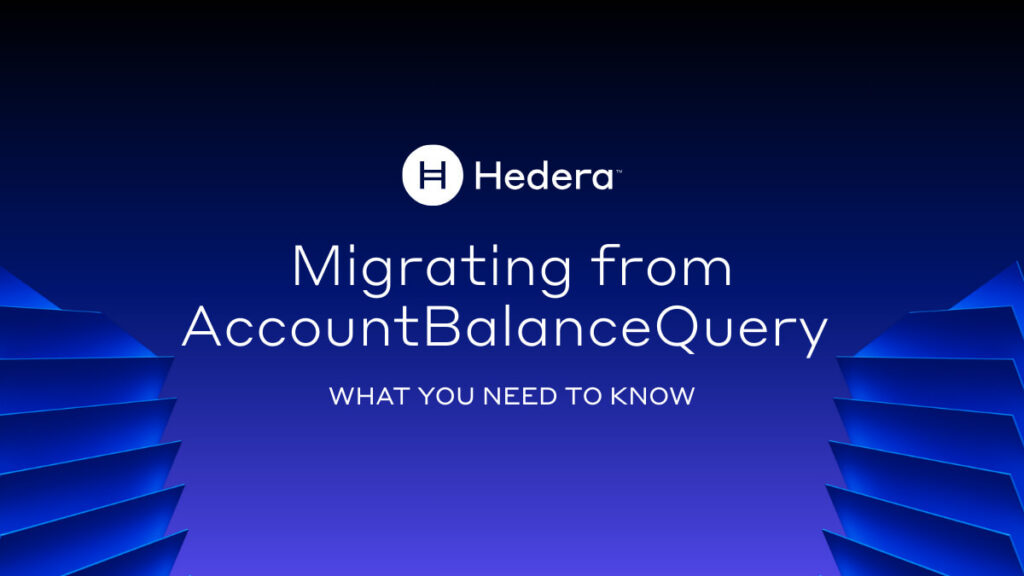Starting January 2026, the price for the ConsensusSubmitMessage transaction will increase from $0.0001 to $0.0008 USD. This change will take effect with the v0.69 mainnet release and applies only to ConsensusSubmitMessage transactions. This update improves the long-term economic sustainability of the Hedera network, while preserving predictable and USD-fixed pricing for developers. For more information, visit https://hedera.com/blog/price-update-to-consensussubmitmessage-in-consensus-service-january-2026.
We’re proud to announce that the Hedera Token Service (HTS) is officially live on the Hedera mainnet. Over 60 initial ecosystem partners have joined us in this announcement — they’ve integrated, are in the process of integrating, or exploring HTS to support applications issuing tokens across decentralized finance, supply chain, payments, energy, and more.
By building applications with HTS and issuing them on the Hedera public network, businesses can embrace the disruption of tokenization in a secure, compliant, and performant way — this includes monetizing an organization’s assets, improving payment settlement efficiency, or accessing new and growing token markets.
The Hedera Token Service offers configuration and issuance of native fungible and non-fungible tokens in a fast, secure, and cost-effective way. Assets tokenized with HTS deliver native programmability and configurable compliance at the account level, all without deploying slow, expensive, and potentially faulty smart contracts.
Let’s walk through a few aspects of the Hedera Token Service (HTS) to get up to speed — in this blog posting, we’ll learn about:
-
The initial token ecosystem of over 60+ wallets, exchanges, issuers, council members, network explorers, and more to support token issuers and application developers
-
Game-changing differentiation for fungible & non-fungible tokens on Hedera
-
HTS demo applications, tutorials, and developer resources available today
-
Functionalities coming to the Hedera Token Service in 2021
A thriving token ecosystem to support application developers, token issuers, and end-users
Hedera has proven its ability to scale relative to other public blockchains, as seen from the 4.5 million transactions per day driven by real-world high-throughput data integrity use cases — companies like AdsDax, Acoer, The Coupon Bureau, Safe Health Systems, and more are adopting the Hedera Consensus Service (HCS) at a record pace. But how will Hedera’s next phase of development enable the network effects required for a thriving ecosystem?
Meeting the functional requirements of modern-day websites and applications looking to configure, issue, and manage tokenized assets is critical — but it’s equally as important, if not more, to deliver a robust and thriving ecosystem for which network participants can use and build their protocols and services. This next phase of Hedera’s development, via the Hedera Token Service (HTS), intends to deliver on those required network effects through interconnected applications that drive net new active accounts and aggregate value of tokenized assets.
The initial ecosystem for Hedera Token Service comprises over 60 partners across the categories of token issuers, wallet and custody providers, exchanges, network explorers, standards boards and systems integrators, security auditors, and more.
 https://hedera.com/blog/new-hedera-token-service-offers-native-token-issuance-and-configurability-without-smart-contracts
https://hedera.com/blog/new-hedera-token-service-offers-native-token-issuance-and-configurability-without-smart-contracts
Hedera Token Service differentiation, fee schedule, and 2021 roadmap
Hedera gathered product feedback from Hedera Council members, application developers, ecosystem partners, standards boards, and more during its conception of the Hedera Token Service.
Hedera determined when building HTS that it must provide enterprise-grade performance, cost, stability, functionality, and built-in compliance configurations that meet the needs of both new and established companies looking to realize the value of tokenization.
The Hedera Token Service goes above and beyond within these categories, including low and predictable pricing and a roadmap that ensures a path to mainstream adoption for years to come.
Flexible configurations
Fungible and non-fungible tokens deployed using the Hedera Token Service (HTS) offers flexible configurations, such as atomic swaps and scheduled transactions (coming soon).
Native tokenization without smart contracts
With the Hedera Token Service, there’s no need to configure slow, expensive, and potentially faulty smart contracts — tokens issued with HTS are native to Hedera. They adopt the same performance, security, and efficiency as hbar cryptocurrency and are safely deployed using common programming languages.
Low, predictable fees
HTS offers low and predictable transaction fees on the Hedera public network — it costs less than 1¢ USD to transfer any sum of a tokenized asset.
Built-in compliance
Key and token configurations at the account level enable businesses to meet compliance needs, including KYC verification and freeze, token supply management, transfer, and more.
Enterprise stability & governance
Hedera’s decentralized governing body of global organizations ensures network stability, decentralized decision making, and a no-fork guarantee.
Hedera Token Service Fee Schedule
Mainnet transaction and query fees for the Hedera Token Service can be estimated using the Hedera Fee Estimator. The Fee Estimator allows you to determine fees (in both USD and HBAR, using the current exchange rate live on the mainnet) for individual transactions & queries based on their characteristics, and projected costs based on expected volume for those transactions.
|
Operation |
USD ($) |
|
TokenCreate |
$1.00 |
|
TokenUpdate |
$0.001 |
|
TokenTransfer |
$0.001 |
|
TokenDelete |
$0.001 |
|
TokenAssociate |
$0.05 |
|
TokenDissociate |
$0.05 |
|
TokenMint |
$0.001 |
|
TokenBurn |
$0.001 |
|
TokenGrantKyc |
$0.001 |
|
TokenRevokeKyc |
$0.001 |
|
TokenFreeze |
$0.001 |
|
TokenUnfreeze |
$0.001 |
|
TokenWipe |
$0.001 |
|
TokenGetInfo |
$0.0001 |
2021 product roadmap
In order to fulfill Hedera’s mission of achieving mainstream adoption, the Hedera Token Service (HTS) and its ecosystem of partners and integrations must be fully built-out — this includes continued effort towards integrating HTS into wallets, exchanges, custody providers, explorers and more.
Hedera also plans to deliver on furthering the functionalities of HTS, such as programmability through the development of scheduled transactions in layer 1, as well as a consensus node network in layer 2 that offers interoperability with other public networks and permissioned blockchain frameworks. A summary of the 2021 roadmap can be found on the Hedera website.
HTS demo applications & developer resources
If you’d like to to tokenize assets on the Hedera network, you may find the following resources helpful in your journey:
Tokenization Whitepaper
Tokenization on Hedera introduces the technical fundamentals of each and aims to assist token issuers with determining the deployment model most appropriate for their use case: https://www.hedera.com/blog/now-available-tokenization-on-hedera-whitepaper/
The Hedera Token Service (HTS)
The Hedera Token Service enables the configuration, management, and transfer of native fungible and non-fungible tokens on Hedera: https://www.hedera.com/token-service/
Getting started tutorials: The Hedera Token Service
The Hedera Token Service (HTS) is used via a robust set of APIs for the configuration, minting, and management of tokens on Hedera, without needing to set up and deploy a smart contract. Tokens are as fast, fair, and secure as hbar and cost a fraction of 1¢ USD to transfer. Get started building using the following tutorials by Hedera Developer Evangelist, Cooper Kunz:
Open Source Fungible Token Demo with HTS
This demo is a user interface written in Javascript (Vue.JS) by Hedera Developer Advocate, Greg Scullard to illustrate the use of the Hedera Token Service: https://github.com/hashgraph/hedera-hts-demo





